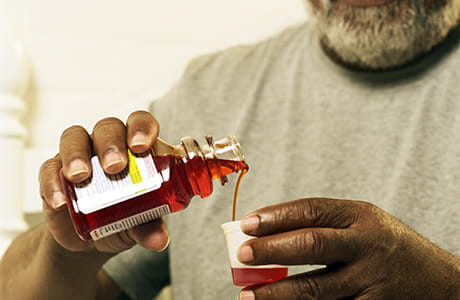Should you tell your doctor about every drug and supplement?
When honesty is your policy, your care team can protect you from drug interactions.
Perhaps you take zinc for an immune system boost, or melatonin for a better night’s sleep. You might smoke cigarettes or drink beer or wine. Or maybe you use cannabis — whether medically or recreationally. Regardless of what drugs or over-the-counter supplements you use, you need to let your care team know.
Any substance, legal or not, could interact with the medications you’re prescribed. So be honest with your care team. They can help you avoid drug interactions that could make your prescription medications less effective — or that could be risky for your health.
Your care team will always keep anything you say completely confidential. They’ll only use the information to keep you healthy and make sure your prescription medications work the way they should.
Alcohol, tobacco and cannabis
Drinking alcohol can interfere with hundreds of medications, including heart medications, blood thinners and pain relievers. Tell your care team about your drinking habits, even if you only drink once in a while. Similarly, smoking cigarettes (or quitting cold turkey) could change how your medications work, so tell your doctor: they might have to adjust your dose.
And the active ingredients in cannabis (marijuana), whether you smoke it or eat it in candy or food, interact with many prescription drugs, including blood thinners and anxiety medications. Cannabis can also interact with anesthetics, so if you’re having surgery, your doctor needs to know about your marijuana use to keep you safe.
Over-the-counter supplements
Dietary supplements can also cause interactions, even if they also have other positive effects. For example, melatonin can help you sleep — but it can also interfere with prescription medications you take for your immune system.
If you take a dietary supplement, it’s safest to buy it at the pharmacy. That way, you can trust the product quality. You can also ask the pharmacist about potential drug interactions.
Honesty helps your care team help you
Sometimes people just want to keep their private business private, or they don’t think their substance use is important enough to mention. But sharing leads to better caring. The more candid you are with your care team, the more effectively they can support your health.
For instance, if you have a few drinks every week, your doctor can tell you if alcohol interacts with your prescription medications — and if so, what signs to watch for. Some interactions make your medications stronger. Others make them weaker or have different effects.
Your doctor might adjust your dose or alter your dosing schedule, like having you take your medication in the morning instead of the evening. And in some cases, they can prescribe a different medication that doesn’t interact with alcohol in the same way.
But even if you suspect an interaction, don’t change your dose on your own. Always talk to your doctor first.
Your pharmacist can help you avoid interactions, too
You can also schedule an appointment with a clinical pharmacist in your doctor’s office to discuss drug interactions. Clinical pharmacists can usually see you faster than your primary care provider, typically within a few days. Remember, anything you say in your consultation will be kept confidential — your care team will only use it to help you maintain your health.
And remember: If you need help with your substance use or that of someone you love, help is available. Talk to your care team or contact the SAMHSA National Helpline at 800-662-HELP (4357).
Next steps:
Find a Geisinger Pharmacy near you
What is a clinical pharmacist?
Could alcohol affect your SSRIs?





